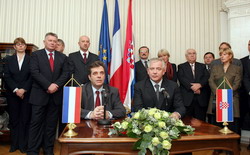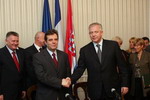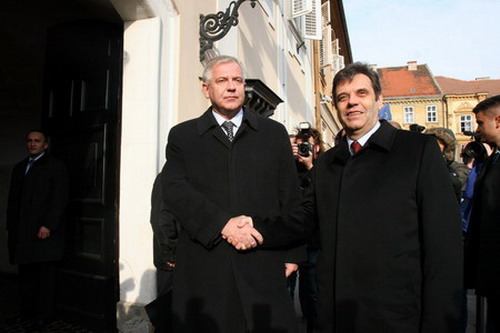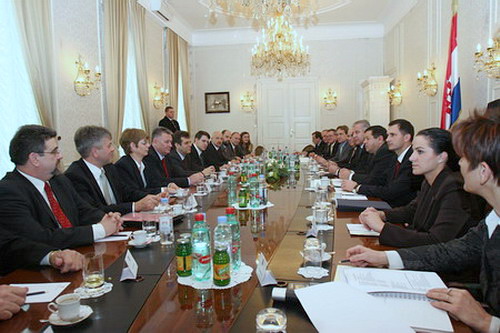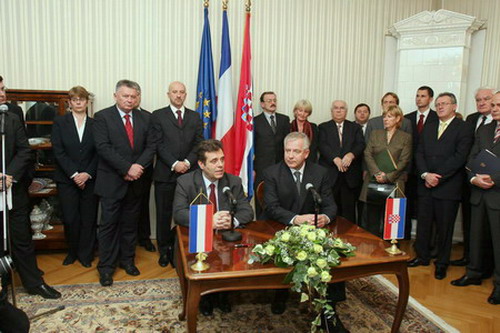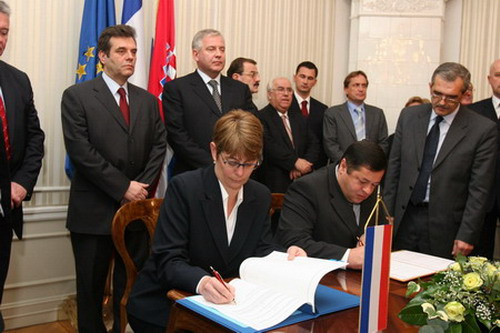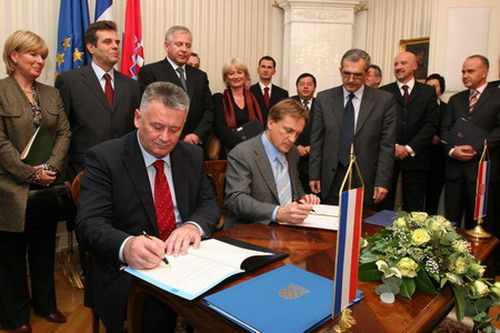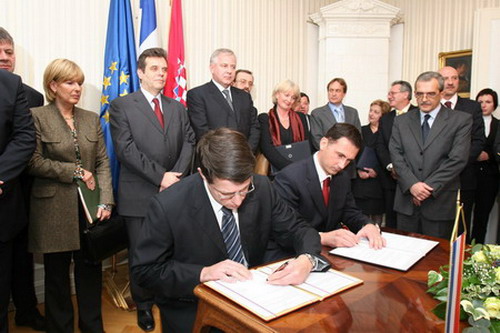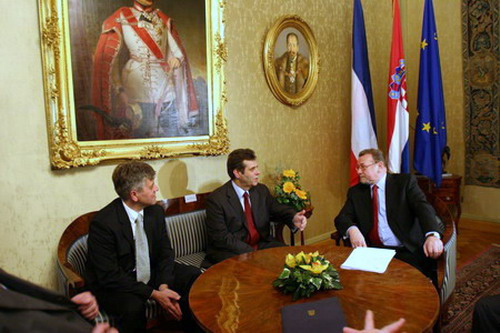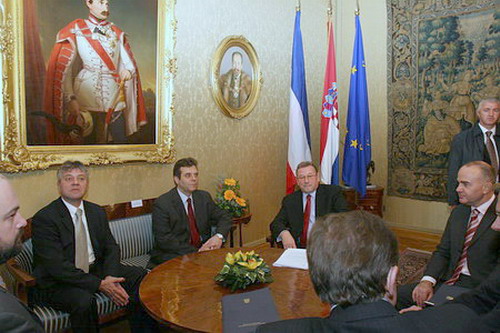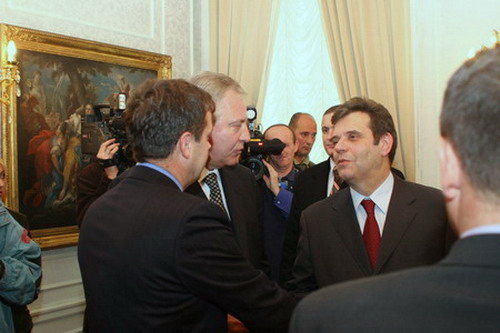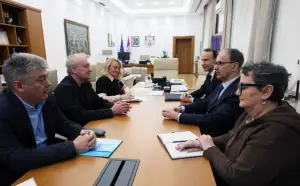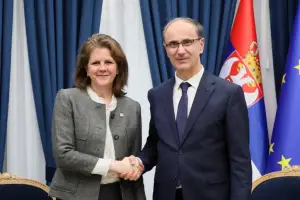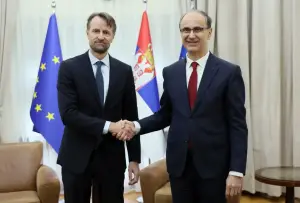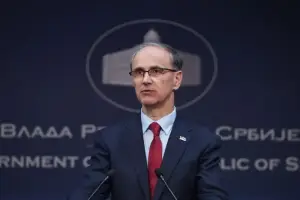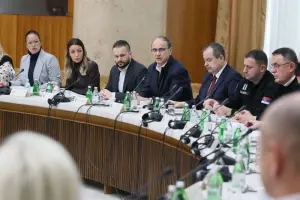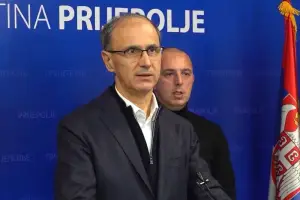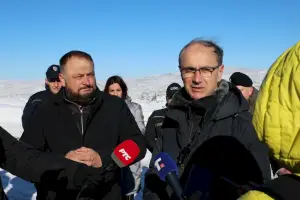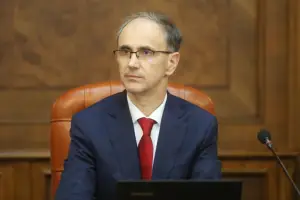Q:
A:
Good relations between Serbia, Croatia important for region and Europe
Belgrade/Zagreb,
23 November 2005
Serbian Prime Minister Vojislav Kostunica and Croatian Prime Minister Ivo Sanader said today in Zagreb that the increasingly improving relations between Serbia and Croatia will add to stability in the region and help to solve outstanding issues.
Following the meeting, Kostunica said that the common European future of Serbia and Croatia is bringing these two countries and their people together, and added that each step Croatia makes towards Europe will undoubtedly be welcomed in Serbia-Montenegro, and interpreted as a sign of advancement of the entire region.
Kostunica said that good relations between the two countries are of extreme importance for regional stability, improvement and prosperity, and that the two governments have put much work into the improvement of relations over the past year. Proof of that can be seen in the signing of the five agreements today in Zagreb, as well as in the agreement on protection of minorities, which is being implemented through meetings of the commission for the protection of minorities and supported by talks in Belgrade, the Prime Minister pointed out. He added that an agreement has been worked out in order to solve the painful issue of the missing, despite initial differences in approaching the issue.
Kostunica reiterated that the refugee issue is being solved even beyond the context of relations between Serbia and Croatia, that is within the framework of relations between Serbia-Montenegro, Croatia and Bosnia and Herzegovina. He added that during today's talks both sides expressed firm will to resolve problems, not augment them.
Sanader said that Kostunica’s visit to Zagreb is a good step towards solving all issues, adding that it is also a sign of the countries’ willingness to demonstrate their responsibility and give a pledge to the future and peace in Europe.
Speaking about borders, the two prime ministers agreed that it is necessary for the state commission to hold a meeting as soon as possible and find an adequate solution in the interest of good bilateral relations, despite certain differences.
Sanader congratulated the Serbian Prime Minister on commencing negotiations on the Stabilisation and Association Agreement, noting that it marks an important point along the way to the European Union.
"We are happy for each step Serbia makes towards Europe because the cooperation of Croatia and Serbia plays a very important role in the political stabilisation and European perspective of this part of Europe", the Croatian Prime Minister pointed out.
He confirmed that Croatia is willing to tackle humanitarian problems and issues remaining from the war, first and foremost, the issue of the missing.
Sanader recalled that last year an agreement on the protection of ethnic minority rights of Croats in Serbia-Montenegro and Serbs in Croatia was signed, and said that ethnic minorities should not present a problem, rather offer chances and opportunities.
He said that the ratification of the agreement in Zagreb and Belgrade therefore has been welcomed, but also the first meeting of the joint commission that will observe the implementation of the agreement in both countries. He also said that Croatia wishes to conclude in entirety the process of return by the end of the upcoming year, for which, the precondition is good will in the intention of returning, as well as the question of ownership.
Speaking about the position of Croatia regarding the question of Kosovo-Metohija, Serbian Prime Minister Vojislav Kostunica said that Zagreb has a constructive approach to resolving the issue of the future status of Kosovo-Metohija.
Kostunica explained that Croatia’s position is that the international community must help in resolving the question of Kosovo-Metohija and it cannot be resolved without the agreement of Belgrade.
He said that the issue of Kosovo-Metohija is difficult enough itself and cannot be isolated, because it is also a European regional issue, even one that concerns the entire international community.
According to Kostunica, all countries in the region should contribute to resolving the issue, and Croatia is undoubtedly doing so by its constructive approach.
Sanader, expressing agreement with the position of the Serbian Prime Minister, said that the position of Croatia is absolutely logical, because the issue is not just an internal issue of Serbia, in fact of the state-union of Serbia-Montenegro, but also has wider implications. He also said that it is expected of the international community and all others that they display objectivity in resolving the issue.
Today Kostunica also met with Croatian President Stjepan Mesic and Parliament Speaker Vladimir Seks, and before that he visited Serbian Cultural Society "Prosvjeta" and the Serbian Orthodox Church municipality in Zagreb. He also talked with representatives of Serbian political parties in Croatia.
Speaking with representatives of Serbs in Croatia, Kostunica said that Serbia is willing to help them in all respects, and added that in the talks with Prime Minister Ivo Sanader he mentioned a series of issues which concern the Serb community in Croatia, and the return of refugees.
Pointing out that both the prime ministers are convinced that these problems should be solved, Kostunica said that as part of economic cooperation, significant help could be given to the areas of return. He added that all problems, including those that refer to refugees, the accused and the missing, should be tackled through more frequent direct contacts of state representatives and competent ministries.
The Serbian Prime Minister voiced readiness that the Serbian Cultural Society "Prosvjeta," as the central cultural institution of Serbs in Croatia, be given business space in Belgrade. Also, he put forward a proposal that some of the resorts in Croatia owned by Serbia offer their premises for holding summer school courses to Serbian pupils.
Serbian Minister of Science and Environmental Protection Aleksandar Popovic confirmed that Serbia will bear half of the costs for the renovation of the birth house of physician Milutin Milankovic in Dalje, and that it will participate in the celebration of the 150th anniversary of birth of scientist Nikola Tesla, which will take place in July 2006.
During the visit to Zagreb, ministers of the two governments signed today five agreements on cooperation, which should contribute to improving relations between Serbia and Croatia.
An agreement on veterinary and phytosanitary cooperation was signed by Croatian Minister of Agriculture Petar Cobankovic and Serbian Minister of Agriculture, Forestry and Water Management Ivana Dulic-Markovic.
Croatian Minister of the Sea, Tourism, Transport and Development Bozidar Kalmeta and Serbian Minister of Capital Investment Velimir Ilic signed an agreement on international combined transport and a protocol on the renovation of the railway bridge Bogojevo-Erdut, the signing was also attended by the ambassadors of Norway and Belgium, whose countries have made donations for these projects.
Croatian Minister of Science and Education Dragan Primorac and Serbian Minister of Science and Environmental Protection Alexander Popovic signed a memorandum on scientific-technological cooperation between Serbia and Croatia.
Together with the Serbian government delegation, Serbian businessmen also visited Zagreb and in talks with the Croatian Prime Minister said that the feeling of insecurity is the biggest obstacle to larger Serbian investments in Croatia.
Serbian Minister of Economy Predrag Bubalo also said that the feeling of insecurity is the main obstacle to Serbian investors, but also voiced hope that this visit to Zagreb will help eliminate that problem.
He said that in the talks with Sanader, he had an impression that Croatia is really open and has a true wish that Serbian investments start coming to that country.
Kostunica said that good relations between the two countries are of extreme importance for regional stability, improvement and prosperity, and that the two governments have put much work into the improvement of relations over the past year. Proof of that can be seen in the signing of the five agreements today in Zagreb, as well as in the agreement on protection of minorities, which is being implemented through meetings of the commission for the protection of minorities and supported by talks in Belgrade, the Prime Minister pointed out. He added that an agreement has been worked out in order to solve the painful issue of the missing, despite initial differences in approaching the issue.
Kostunica reiterated that the refugee issue is being solved even beyond the context of relations between Serbia and Croatia, that is within the framework of relations between Serbia-Montenegro, Croatia and Bosnia and Herzegovina. He added that during today's talks both sides expressed firm will to resolve problems, not augment them.
Sanader said that Kostunica’s visit to Zagreb is a good step towards solving all issues, adding that it is also a sign of the countries’ willingness to demonstrate their responsibility and give a pledge to the future and peace in Europe.
Speaking about borders, the two prime ministers agreed that it is necessary for the state commission to hold a meeting as soon as possible and find an adequate solution in the interest of good bilateral relations, despite certain differences.
Sanader congratulated the Serbian Prime Minister on commencing negotiations on the Stabilisation and Association Agreement, noting that it marks an important point along the way to the European Union.
"We are happy for each step Serbia makes towards Europe because the cooperation of Croatia and Serbia plays a very important role in the political stabilisation and European perspective of this part of Europe", the Croatian Prime Minister pointed out.
He confirmed that Croatia is willing to tackle humanitarian problems and issues remaining from the war, first and foremost, the issue of the missing.
Sanader recalled that last year an agreement on the protection of ethnic minority rights of Croats in Serbia-Montenegro and Serbs in Croatia was signed, and said that ethnic minorities should not present a problem, rather offer chances and opportunities.
He said that the ratification of the agreement in Zagreb and Belgrade therefore has been welcomed, but also the first meeting of the joint commission that will observe the implementation of the agreement in both countries. He also said that Croatia wishes to conclude in entirety the process of return by the end of the upcoming year, for which, the precondition is good will in the intention of returning, as well as the question of ownership.
Speaking about the position of Croatia regarding the question of Kosovo-Metohija, Serbian Prime Minister Vojislav Kostunica said that Zagreb has a constructive approach to resolving the issue of the future status of Kosovo-Metohija.
Kostunica explained that Croatia’s position is that the international community must help in resolving the question of Kosovo-Metohija and it cannot be resolved without the agreement of Belgrade.
He said that the issue of Kosovo-Metohija is difficult enough itself and cannot be isolated, because it is also a European regional issue, even one that concerns the entire international community.
According to Kostunica, all countries in the region should contribute to resolving the issue, and Croatia is undoubtedly doing so by its constructive approach.
Sanader, expressing agreement with the position of the Serbian Prime Minister, said that the position of Croatia is absolutely logical, because the issue is not just an internal issue of Serbia, in fact of the state-union of Serbia-Montenegro, but also has wider implications. He also said that it is expected of the international community and all others that they display objectivity in resolving the issue.
Today Kostunica also met with Croatian President Stjepan Mesic and Parliament Speaker Vladimir Seks, and before that he visited Serbian Cultural Society "Prosvjeta" and the Serbian Orthodox Church municipality in Zagreb. He also talked with representatives of Serbian political parties in Croatia.
Speaking with representatives of Serbs in Croatia, Kostunica said that Serbia is willing to help them in all respects, and added that in the talks with Prime Minister Ivo Sanader he mentioned a series of issues which concern the Serb community in Croatia, and the return of refugees.
Pointing out that both the prime ministers are convinced that these problems should be solved, Kostunica said that as part of economic cooperation, significant help could be given to the areas of return. He added that all problems, including those that refer to refugees, the accused and the missing, should be tackled through more frequent direct contacts of state representatives and competent ministries.
The Serbian Prime Minister voiced readiness that the Serbian Cultural Society "Prosvjeta," as the central cultural institution of Serbs in Croatia, be given business space in Belgrade. Also, he put forward a proposal that some of the resorts in Croatia owned by Serbia offer their premises for holding summer school courses to Serbian pupils.
Serbian Minister of Science and Environmental Protection Aleksandar Popovic confirmed that Serbia will bear half of the costs for the renovation of the birth house of physician Milutin Milankovic in Dalje, and that it will participate in the celebration of the 150th anniversary of birth of scientist Nikola Tesla, which will take place in July 2006.
During the visit to Zagreb, ministers of the two governments signed today five agreements on cooperation, which should contribute to improving relations between Serbia and Croatia.
An agreement on veterinary and phytosanitary cooperation was signed by Croatian Minister of Agriculture Petar Cobankovic and Serbian Minister of Agriculture, Forestry and Water Management Ivana Dulic-Markovic.
Croatian Minister of the Sea, Tourism, Transport and Development Bozidar Kalmeta and Serbian Minister of Capital Investment Velimir Ilic signed an agreement on international combined transport and a protocol on the renovation of the railway bridge Bogojevo-Erdut, the signing was also attended by the ambassadors of Norway and Belgium, whose countries have made donations for these projects.
Croatian Minister of Science and Education Dragan Primorac and Serbian Minister of Science and Environmental Protection Alexander Popovic signed a memorandum on scientific-technological cooperation between Serbia and Croatia.
Together with the Serbian government delegation, Serbian businessmen also visited Zagreb and in talks with the Croatian Prime Minister said that the feeling of insecurity is the biggest obstacle to larger Serbian investments in Croatia.
Serbian Minister of Economy Predrag Bubalo also said that the feeling of insecurity is the main obstacle to Serbian investors, but also voiced hope that this visit to Zagreb will help eliminate that problem.
He said that in the talks with Sanader, he had an impression that Croatia is really open and has a true wish that Serbian investments start coming to that country.

